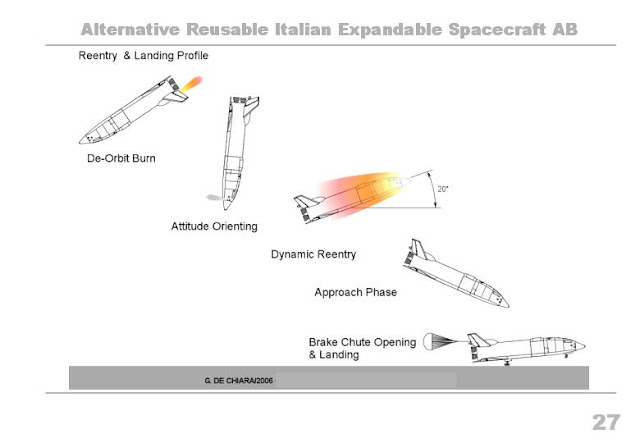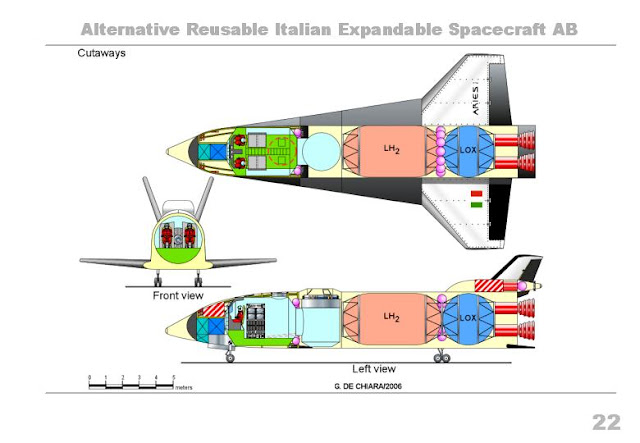Thales Alenia Space e Avio hanno di recente firmato un contratto da 167 milioni di € per lo sviluppo del sistema di trasporto automatizzato senza equipaggio.
L’Industria italiana è come sempre in prima fila per la realizzazione del mini-shuttle europeo Space Rider: Thales Alenia Space (Thales 67%, Leonardo 33%) e Avio hanno firmato con l’Esa un contratto per lo sviluppo di quello che sarà il primo sistema europeo di trasporto automatizzato e riutilizzabile per missioni senza equipaggio, che permetterà accesso e ritorno di routine da un’orbita bassa.
La nuova navetta spaziale sarà grande come una roulotte e sarà lanciata nel 2023 tramite il razzo italiano Vega C light: resterà in orbita due mesi, ospitando a bordo vari esperimenti scientifici, per poi rientrare nell'atmosfera e atterrare con una precisione di 150 metri per poi essere riutilizzato per altre sei volte.
Thales Alenia Space, con un consorzio di imprese, università e centri di ricerca europei, è responsabile per lo sviluppo del modulo di rientro, parte essenziale del veicolo che raccoglie l'eredità di IXV, la navetta sperimentale realizzata in Italia e testata nel 2015 con il sostegno dell'Agenzia spaziale italiana (Asi). L’italiana Avio sarà invece responsabile dello sviluppo del sistema di razzi e del modulo di servizio espandibile.
Space Rider sarà lanciato nello spazio a bordo del lanciatore Vega C, sviluppato sempre dall’italiana Avio per l’Esa e aprirà la strada all'Europa per un uso più accessibile, agile e indipendente dello spazio in orbita bassa.
Space Rider sarà un sistema unico al mondo che espanderà le capacità e gli impieghi del lanciatore Vega anche nelle attività di missioni orbitali estese nel tempo e per il rientro dallo spazio.
Thales Alenia Space e Avio hanno anche siglato anche un secondo contratto con Altec e Telespazio per la gestione del segmento di Terra e delle operazioni della missione Space Rider. Altec è responsabile della gestione degli esperimenti scientifici e tecnologici a bordo del veicolo durante la fase di missione nominale, e sarà responsabile di gestire la fase di missione relativa al rientro atmosferico del veicolo.
Telespazio sarà responsabile delle attività di sviluppo, integrazione e validazione del VCC-OC (Vehicle Control Centre-Operations Control) e dello sviluppo, validazione ed esecuzione delle operazioni di volo.
Inoltre, Telespazio sarà responsabile della realizzazione e della gestione della rete di stazioni a terra. Tutte le operazioni di volo saranno gestite dal Centro spaziale del Fucino. L’Italia si è fatta promotrice di questo progetto sin dall’inizio e si è impegnata a promuovere questo programma raccogliendo le adesioni di molti altri Paesi. Questo progetto sarà un traguardo importante per l’Italia e per l’Europa tutta.
ENGLISH
"ARIES A-B, ESA's mini-shuttle for future space missions
Thales Alenia Space and Avio recently signed a €167 million contract to develop the automated unmanned transport system.
Italian industry is, as always, at the forefront of the development of the European Space Rider mini-shuttle: Thales Alenia Space (Thales 67%, Leonardo 33%) and Avio have signed a contract with the ESA for the development of what will be the first European automated and reusable transport system for unmanned missions, allowing routine access and return from low orbit.
The new space shuttle will be the size of a caravan and will be launched in 2023 by the Italian Vega C light rocket: it will stay in orbit for two months, hosting various scientific experiments on board, before re-entering the atmosphere and landing with an accuracy of 150 metres to be reused six more times.
Thales Alenia Space, with a consortium of European companies, universities and research centres, is responsible for developing the re-entry module, an essential part of the vehicle that takes up the legacy of IXV, the experimental shuttle built in Italy and tested in 2015 with the support of the Italian Space Agency (Asi). Italy's Avio will instead be responsible for developing the rocket system and expandable service module.
Space Rider will be launched into space aboard the Vega C launcher, also developed by Italy's Avio for ESA, and will pave the way for Europe to make more accessible, agile and independent use of space in low orbit.
Space Rider will be a unique system in the world that will expand the capabilities and uses of the Vega launcher to include extended orbital missions and re-entry from space.
Thales Alenia Space and Avio have also signed a second contract with Altec and Telespazio for the management of the ground segment and operations of the Space Rider mission. Altec is responsible for managing the scientific and technological experiments on board the vehicle during the nominal mission phase, and will be responsible for managing the mission phase relating to the atmospheric re-entry of the vehicle.
Telespazio will be responsible for the development, integration and validation of the VCC-OC (Vehicle Control Centre-Operations Control) and the development, validation and execution of flight operations.
In addition, Telespazio will be responsible for the implementation and management of the ground station network. All flight operations will be managed by the Fucino Space Centre. Italy has been a promoter of this project from the outset, and is committed to promoting this programme by gathering the support of many other countries. This project will be an important milestone for Italy and for Europe as a whole.
(Web, Google, Wikipedia, Repubblica, You Tube)












Nessun commento:
Posta un commento
Nota. Solo i membri di questo blog possono postare un commento.